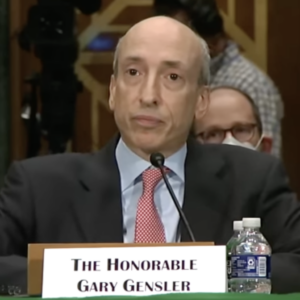“Operation Choke Point 2.0”
That’s what cryptocurrency advocates call the surge of dubious lawsuits against the industry from Gary Gensler’s SEC. The original Operation Choke Point – a program put together by the Obama Justice Department in 2013 that targeted gun dealers, payday lenders, and sex workers – was roundly criticized by Congress and political commentators. It was eventually shut down in 2017.
The new version from the Security and Exchange Commission has the same goal as the original: use litigation to accomplish what opponents of the industry can’t achieve via legislation or get approved as regulation.
Only, this new version of the program may suffer a more humiliating, public defeat.
SEC Commissioner Gensler was scolded by a New York federal judge in July for misapplying the Howey Test in a case involving Ripple Inc., a California blockchain company. The Howey Test is used to determine what defines an investment contract. Gensler claimed that Ripple was committing a securities violation by selling its token called XRP.
Weeks later, a panel of federal judges in Washington, DC said that the SEC acted capriciously by denying Grayscale’s proposal to create a mutual fund that’s traded on a stock exchange. “The Commission failed to adequately explain why it approved the listing of two bitcoin futures ETPs but not Grayscale’s proposed bitcoin ETP. In the absence of a coherent explanation, this unlike regulatory treatment of like products is unlawful,” judges wrote.
Crypto analysts see the SEC’s strategy as one mimicking the Justice Department in going after the little guys today in hopes of getting the big guys tomorrow.
“A lot of other tokens earlier on either pleaded out or settled with the SEC,” Luke Hogg, Director of Outreach at the Foundation for American Innovation, told DCJournal. “[Gensler] started with the really, really small fish…They finally got to Ripple and Ripple said, ‘We’re not going to take this lying down,’ and good on them. The SEC definitely lost the case.”
Ripple CEO Brad Garlinghouse told Axios after the ruling, “The SEC sued me personally too, so I feel vindicated,” adding that the court’s decision is “a win for crypto in the U.S.”
It’s not just Gensler’s SEC that’s targeting crypto, industry observers told DCJournal.
“There just seems to be a war on crypto if you look at the FDIC in discouraging banks in dealing with crypto,” said John Berlau, the Director of Finance Policy at the Competitive Enterprise Institute. “It’s like a whole of government initiative from the Biden administration. He definitely thinks that crypto should be just like a security – like stock and bond – when it clearly differs from that. It’s more like a consumer product.”
The SEC has yet to announce its next steps, but Hogg believes the proverbial die is cast. “They’re not backing down,” he said. “It’s an ideological thing. They’re going to pursue appeals in these cases.”
Gensler made his feelings about crypto crystal clear when he announced the SEC’s lawsuit targeting Coinbase: “We don’t need more digital currency. We already have digital currency. It’s called the U.S. dollar. It’s called the euro. It’s called the yen. They’re all digital right now. We already have digital investments,” he said. Coinbase is one of America’s largest cryptocurrency trading platforms.
It’s these words, along with Operation Choke Point 2.0, that have Gensler critics suggesting that he’s got a vendetta against crypto, rather than a well-founded policy.
“At a deeper level it comes down fear of innovation and changes,” Hogg said. “They don’t want disruption. They don’t want change…if you look at it, America’s top business is finance.”
Berlau agrees. “I think the banking industry has had some influence on pushing crypto restrictions, particularly on the 2021 recommendation of the President’s Working Group on Financial Markets that stablecoins should only be issued by banks. Also, I think both Gensler and his Trump-appointed predecessor Jay Clayton may be biased against crypto because of their backgrounds working in and with the investment banking industry.”
Congress may eventually weigh in, but there’s no guarantee.
“You will find very often that Congress reacts, as opposed to thinking in a forward matter,” said Sen. Bill Hagerty (R-Tenn.) told a recent Cato Institute event. “I think a lot of people in the crypto industry are very concerned that we’re using bank supervisory powers to choke off the crypto market…Congress should step in and take action.”
One person who has long supported Congressional action regulating crypto? Gary Gensler. “If you want to invest [in crypto] you should be knocking on the SEC doors and Congress’s doors and say ‘please bring some semblance of sanity to these crypto exchanges’,” he told the Institutional Crypto Conference at Bloomberg Headquarters in 2018. “Then you can have more confidence on the price discovery function.”
Hogg suggested that Congress pass a spoke regulation system that allows innovation and flourishing sandboxes, along with transparency. “There should and could be more investor protections and guardrails to prevent fraud and scams. But we need to do that in a smart way.”
An SEC spokesperson said “We decline to comment,” when asked about the suits.


